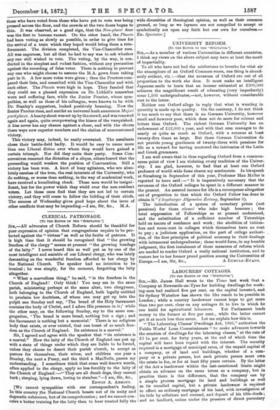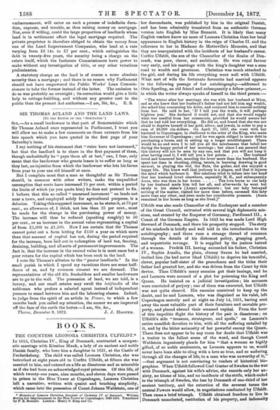LABOURERS' COTTAGES.
[To MS EDITOR OF THE "SPECTATOR."] SIR,—Mr. James Hall wrote to the Times last week that a Company at Newcastle-on-Tyne for building dwellings for work- ing-men had realized five per cent. on the capital invested, and Sir Sydney Waterlow has shown the like result to be possible in London ; while a country landowner cannot hope to get more than two per cent. clear on any cottages fit to live in which he
can build for agricultural labourers. Yet Parliament lends money to the former at five per cent., while the latter cannot get it at much less than seven. Let me explain how this is.
" The Labouring Classes' Dwellings Act, 1866," authorises the Public Works' Loan Commissioners " to make advances towards' the erection of dwellings for the labouring classes," at the rate of £5 ls. per cent. for forty years, at the end of which time the capital will have been repaid with the interest. The security required is a mortgage of municipal rates, of the unpaid capital of a company, or of land and buildings, whether of a com- pany or a private person, but such private person must own the estate in fee, or for at least fifty years certain. By the letter of the Act a landowner within the last-mentioned limits might obtain an advance on the same terms as a company, but in practice there is this difference, that the company can by a simple process mortgage its land and buildings as well as its uncalled capital, but a private landowner is required to effect an ordinary mortgage of his land, with investigation of his title by solicitors and counsel, and deposit of his title-deeds ; and no landlord, unless under the pressure of direct pecuniary
embarrassment, will enter on such a process of indefinite dura- tion, expense, and trouble, as thus raising money on mortgage. Nor, even if willing, could the large proportion of landlords whose land is in settlement effect the legal mortgage required. The private proprietor is therefore obliged to obtain the money from one of the Land Improvement Companies, who lend at a rate varying from £6 14s. to £7 per cent., which extinguishes the debt in twenty-five years, the security being a charge on the estate itself, which the Inclosure Commissioners have power to make without any investigation of title, or any other vexatious preliminaries.
A statutory charge on the land is of course a more absolute security than a mortgage ; and there is no reason why Parliament should not have empowered the Public Works' Loan Commis- sioners to take the former instead of the latter. The omission to do so was probably an oversight ; its correction would give a little help to cottage-building, and without any greater cost to the public than the present Act authorises.—I am, Sir, &c., E. S.











































 Previous page
Previous page